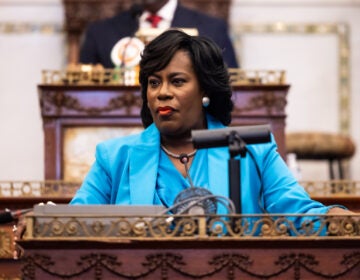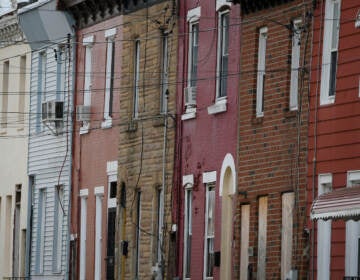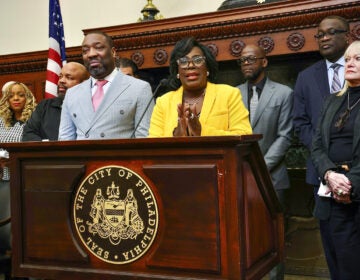Philly Council wants to stop an ‘avalanche’ of evictions with COVID-19 rent relief
Philly councilmembers introduced a package of six bills designed to aid renters affected by the coronavirus pandemic.
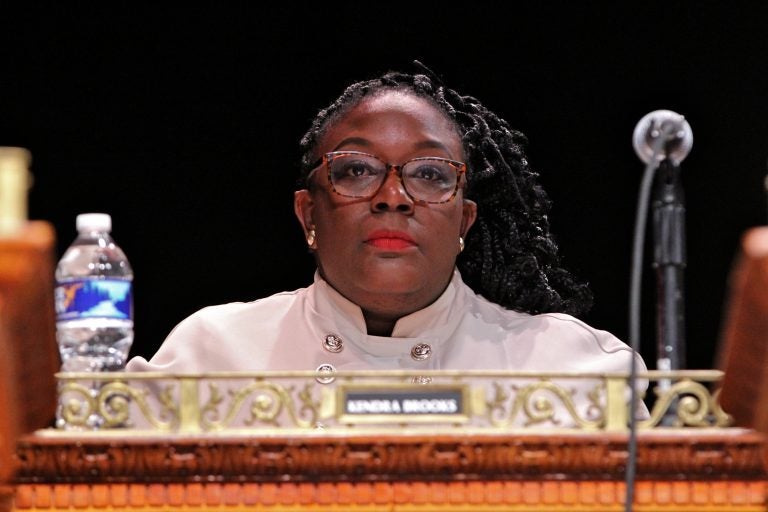
Philadelphia City Councilmember Kendra Brooks. (Emma Lee/WHYY)
Are you on the front lines of the coronavirus? Help us report on the pandemic.
Israel Moreno Jr. had just moved when the coronavirus pandemic cost him his job as a line cook at a Philadelphia restaurant.
He used his savings to pay his first month’s rent and the deposit on his new spot — a room in a house in the Fairhill section of North Philadelphia. The new place put him closer to his 13-year-old son but the move meant he would be living paycheck to paycheck for some time. Then he lost his paycheck.
Moreno pays $350 a month to rent his room — less than many of the 1.6 million newly unemployed people in Pennsylvania — but it’s still more than he has.
“Although $350 is not a lot, the fact is that I don’t have it,” Moreno said.
May 1 marked the second rent day since the coronavirus pandemic shut down the region and the livelihoods of millions. Many of those who lost their jobs now, like Moreno, risk losing their homes.
In Philadelphia, City Councilmembers Helen Gym, Kendra Brooks and Jamie Gauthier introduced on Friday a package of six bills to protect economically vulnerable renters and landlords. They hope to prevent a coronavirus-induced wave of homelessness.
The city has put a hold on evictions through May 29 because of court closures, and courts won’t consider new evictions or enforcement on evictions from before the coronavirus-induced closures until June 1. But there are already 1,700 evictions scheduled to go before a judge in municipal court come June.
“We can’t afford to allow our city to come under an avalanche of evictions, both in our courts and exacerbating problems in our shelters and on our streets. We really need to come together with a protective package that keeps people housing stable and tries to get our landlords paid,” Gym said.
Protections for renters that would last a year
If approved, the bills would extend the eviction moratorium for another 60 days after the state’s shutdown order lifts and allow renters to pay rent in a one-year time frame. They would also facilitate mediation between renters and landlords, waive late fees for a year and allow renters illegally locked out to recover damages.
One piece of legislation, introduced by Brooks, would “stabilize” rents during the pandemic and for a year afterward. During that period, landlords would be subject to limitations on rent increases “retroactive to March 1, 2020 for those experiencing financial hardship related to the pandemic,” according to a release.
The package also includes a resolution asking the state and federal governments for a comprehensive rent assistance package.
While the bills go through the legislative process, Gym said renters should communicate directly with their landlords to arrange a payment plan. The city has protections in place that prohibit utility shut-offs or evictions.
But Rachel Garland of Community Legal Services, which represents low-income renters in municipal court, said illegal evictions are increasing sharply. Some landlords are shutting off utilities or changing the locks on the door, while others are threatening their tenants that they’ll be evicted or that they will call immigration authorities if they don’t pay rent.
“At Community Legal Services we would normally see about six to seven calls a month about an illegal lockout and now we’re seeing about 20 calls a month,” Garland said. “So the tenants are evicted without the benefit of being able to go through the court process.”
‘It can’t be all me and it can’t be all them’
Aryi Peebles’ hot water was cut-off in March. They were two days’ late on the rent for a West Philly apartment they share with their 21-year old daughter. They said they got the water back after getting assistance from CLS, but their landlord then cut off their light, heat and gas.
“So I had no way to cook,” said Peebles, who owns a small digital marketing company. “All the food that we had stockpiled, up to $500 worth of food, went bad.”
The family had to use money they would have put toward rent to buy more food, Peebles said.
“It’s not that I don’t want to pay the rent,” said Peebles, who is a lead organizer with the grassroots group One Pennsylvania. “I wanted to pay the rent, but because of his actions, it caused me to not be able to pay the rent.”
Peebles said they’re grateful for the emergency housing package introduced at City Council. They said the measures would help get them back on their feet and also help landlords too, a group whose struggles they understand since they own a small business.
Landlord advocacy organizations, such as the Homeowners Association of Philadelphia (HAPCO), have encouraged all its members to obey the moratorium on evictions and understand that many people are in dire financial straits.
Robert C. Levin, a HAPCO board member with hundreds of properties in the city, said landlords are willing to negotiate with their renters as long as bills eventually get paid.
“It can’t be all me and it can’t be all them,” Levin said. “We will waive late charges and fees and other types of penalties under these circumstances, provided that the tenant speaks to his landlord, provides the landlord with a real true picture of what the financial situation is and comes up with a plan to pay that is agreeable to both landlord and tenant.”
Levin said some of the compromises proposed by the set of bills are reasonable. Others, he said, HAPCO finds problematic. For instance, extending the eviction moratorium for 60 days could extend months of relief to tenants who might not have any intention of paying their rent, while landlords have to continue paying their bills, Levin said. He described that measure as “a blanket for somebody who has nefarious intentions.”
Others say the legislators’ efforts don’t do enough to help renters. The Philly Tenants Union called for a rent strike on Friday and demanded City Council extend the eviction moratorium. They want state and federal officials to cancel rent and mortgage payments for “at least six months.”
“People think that a rent strike is just a call for all people across the board to, in their own sort of anarchic way, not pay rent,” said Kyla van Buren, a representative with Philly Tenants Union.
But what her organization is doing, van Buren said, is encouraging tenants to collectively negotiate with their landlords, asking for payment plans, rent reductions or forgiveness — depending on their needs. And if the negotiation doesn’t work, withhold rent as a way to be able to escalate their power when facing big landlords.
“While I’m sure that there are many landlords that are experiencing intense income loss right now, I still believe that they have a much greater power both politically and financially to stay afloat rather than your everyday person who works as a server in a restaurant,” she said.
Garland, of Community Legal Services, said the bill package is a compromise: It sets a framework for landlords to get paid while helping renters stay safe and sheltered.
“And so as a tenant advocate, is this everything that I would want? No, but I think it’s a really good step in the right direction,” she said.
Meanwhile, in North Philadelphia, Israel Moreno keeps trying to find a way to pay April’s rent.
His unemployment compensation benefits have not come through yet, and neither has his stimulus check. He has received some help from his former employer — MilkBoy bar — but with no income on sight and a child to support, he’s relying on charity.
This week he sent a message to everyone he knows: “Peace and love. I’m reaching out to all my friends for donations. I’m not working. No money. I’m asking for $20 on venmo or cash app. Can you please help me?”
 WHYY is one of over 20 news organizations producing Broke in Philly, a collaborative reporting project on solutions to poverty and the city’s push towards economic justice. Follow us at @BrokeInPhilly.
WHYY is one of over 20 news organizations producing Broke in Philly, a collaborative reporting project on solutions to poverty and the city’s push towards economic justice. Follow us at @BrokeInPhilly.
WHYY is your source for fact-based, in-depth journalism and information. As a nonprofit organization, we rely on financial support from readers like you. Please give today.



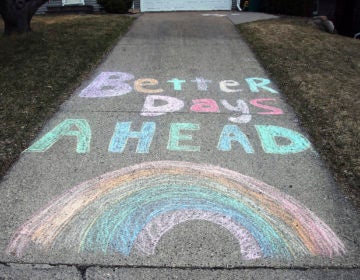


![CoronavirusPandemic_1024x512[1]](https://whyy.org/wp-content/uploads/2020/03/CoronavirusPandemic_1024x5121-300x150.jpg)
